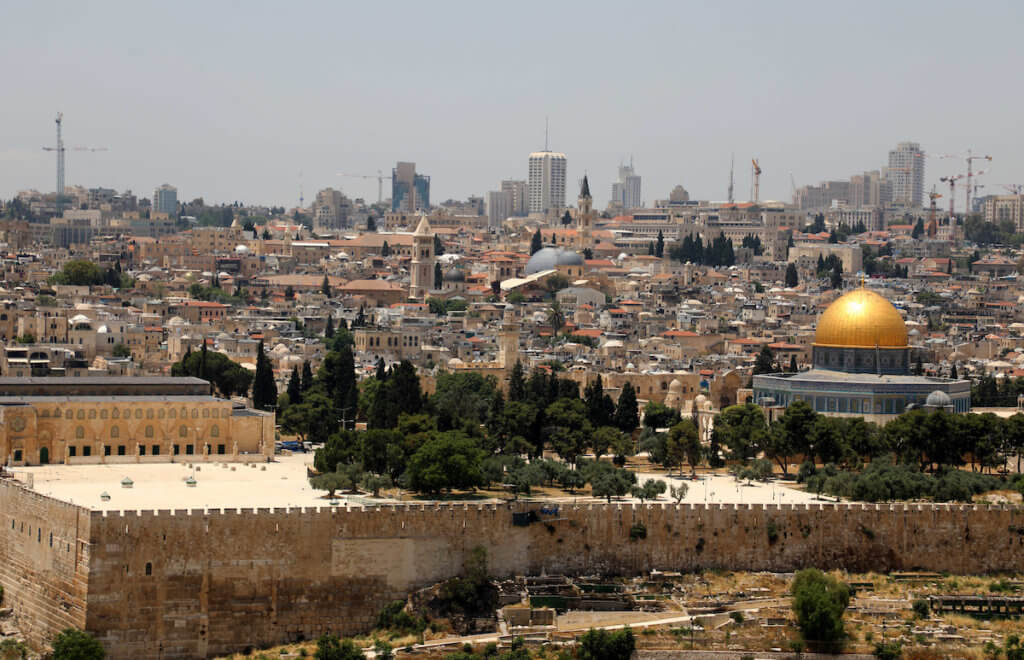Editor’s note: On September 3, 2020, Dr. Alon Ben-Meir, a professor of international relations at the Center for Global Affairs at NYU, published the op-ed “Time is running out for the Palestinians” in the Augusta Free Press, arguing unless the Palestinian government joins negotiations with Israel now, “they will, by their own actions and misguided policies, scuttle any prospect left for establishing a Palestinian state.”
As I read your article, “Time is Running out for Palestinians,” I felt the weight of heavy boots on Palestinian necks.
You blame the Palestinians for missing all opportunities to make peace with the State of Israel and you call the unholy rush of some rich Arab leaders to normalize relations with Israel as a move towards peace. You consider the fact that the Palestinians are not joining this opportunistic haste as another missed opportunity. The truth is, there has not been one genuine opportunity for a just peace that Palestinians missed. Palestinians rejected many offers to surrender their legitimate rights and they were brave and steadfast in refusing to abdicate their rights in spite of the enormous weight of Israeli, U.S., hyper Zionist, Christian Zionist, rich Arab leadership and your very own boots on our neck.
During the Oslo Accord of 1993, the Palestinian leadership, in good faith, accepted the possibility of a two-state solution. They recognized Israel and its dominance on 78% of historic Palestine. Israel’s late Prime Minister Rabin declared before the world, “… no more Jewish settlements in the West Bank”.Consequently, he was assassinated. Who assassinated him? An Israeli who fulfilled the wishes of thousands of Israelis that preferred stealing Palestinian lands and building segregated Jewish settlements on them rather than making peace with their Palestinian neighbors. On one occasion, I asked the late Palestinian President Yasser Arafat why he, in 2000, refused Ehud Barak’s offer to make peace with Israel. He responded with, “I accepted most of Israel’s proposals and conditions.” However, he continued, “The Israelis refused to acknowledge our right of ownership of Haram al-Sharif and the Al-Aqsa Mosque.” Arafat said Barak told him, “…the buildings are yours but the sky above them and the earth below them belongs to us [Israelis].” Arafat could not surrender the Al-Aqsa and Haram al-Sharif against the will of millions of Palestinians, Arabs and Muslims.

If you have doubts as to which party dragged its feet and put the brakes on the peace process just have a frank conversation with former Secretary of State John Kerry. Kerry was no enemy of Israel and no friend to Palestinians. He begged the Israeli leaders to halt settlement expansion to provide a chance for peace, but to no avail. His conclusion is highlighted in this New York Times report:
“Secretary of State John Kerry accused Prime Minister Benjamin Netanyahu of Israel on Wednesday of thwarting peace in the Middle East, speaking with a clarity and harshness almost never heard from American diplomats when discussing one of their closest and strongest allies. With only 23 days left in his four-year turn as secretary of state, during which he made the search for peace in the Middle East one of his driving missions, Mr. Kerry said the Israeli government was undermining any hope of a two-state solution to its decades-long conflict with the Palestinians.”
I agree with you, Alon, that today Israel is strong, and Palestinians are weak; Israel is rich, and Palestinians are poor; Israel has the U.S. and some Arab states on its side, and those on the Palestinian side are not as dependable. However, international law and legitimacy are on the side of Palestinians. All the accusations and arguments that you propagated in your article are not enough to cause Palestinians to surrender. Even if we surrender, we will get nothing but ridicule from Israeli leaders. Furthermore, since we make up half the population from the River Jordan to the Mediterranean Sea, if we surrender, we have nowhere to go. Israel has one of three choices in dealing with us: a just two-state solution, one democratic state or an apartheid regime. Any state that keeps half of its population under occupation for over half a century and forces two million of them under a perpetual, suffocating blockade, shows no genuine inclination towards peace.
We will continue to demand our legitimate rights. We are not irrational, and we are not stepping outside the boundaries of international validity. We are not against a two-state solution if the Palestinian territory in the West Bank is not largely stolen by Jewish settlers. We are willing to live within a one-state if all individuals in the state have equal rights. Netanyahu repeatedly said, “There will never be a Palestinian state on my watch!” How can any rational person expect Palestinians to achieve a two-state solution when the Israeli prime minister is vehemently against it?
Alon, if you wish for Israelis to live in peace, call on Israeli leaders to practice justice.
As for the Deal of the Century and the other recent U.S./Israeli peace proposals, it is absurd for the U.S. and Israel to serve the Palestinians one assault after the other and, soon after, call on them to sign a peace accord.
Please Alon Ben Meir, help get Israel’s boots off our neck! We desperately need some fresh air!
This article was originally published under the headline “Heavy boots on Palestinian necks – A Palestinian Response to Alon Ben Meir” by Come and See: The Christian Website from Nazareth on Sep. 13, 2020 and is reprinted with permission.



The point made by Arafat about Barak and the mosque. Why did Arafat not communicate that to counter the charge of fault being leveled against him? Was he clueless on PR considerations, have ears he didn’t use?
Nearly all observers know Israel has been unwilling to make a deal. Seems like Abbas would work on a plan B. Is he blind or unaware how to leverage law, legitimacy and human rights to his people’s advantage? Is pointing that out “blaming” him or waking him up? Palestinians are up against a double game and masters at PR and that requires savvy. If he doesn’t have it, hire it.
Israel has one of three choices in dealing with us: a just two-state solution, one democratic state or an apartheid regime.
Seriously? There are way more than 3 options, one of which is an Israel that includes Judea and Samaria next to the Palestinian state of Gaza.
“The Israelis refused to acknowledge our right of ownership of Haram al-Sharif and the Al-Aqsa Mosque.”
Because for so long as the Palestinians persist in believing their own Jerusalem claim there is no point in resuming negotiations.
In 1993 the Palestinians agreed to self-rule while postponing negotiations. Israel did not accept the creation of a Palestinian state and the Israeli prime minister that you mourn explicitly rejected the idea. Israeli offer of an actual Palestinian state had to wait until Barak.
Arafat and Abbas both got offers and both rejected them. There are lots of excuses being made in the article for why they did so. The offers were supposedly insufficient. Such an argument can always be made by people that think they should get everything. Yet if we look at the current situation, is it better? Is it changing for the better? Is there something that could shift the momentum sufficiently for the terms of reference to change to favor the Palestinians? Are future offers going to be better? Nope. The Palestinians could have had their own country by now. And they don’t. And that is really on them and their leaders.
Yes, Bibi isn’t interested in peace with the Palestinians. But it isn’t an issue in Israel any longer because the overwhelming consensus is that there is simply no offer Israel can make that the Palestinians will accept because the Palestinians want everything.